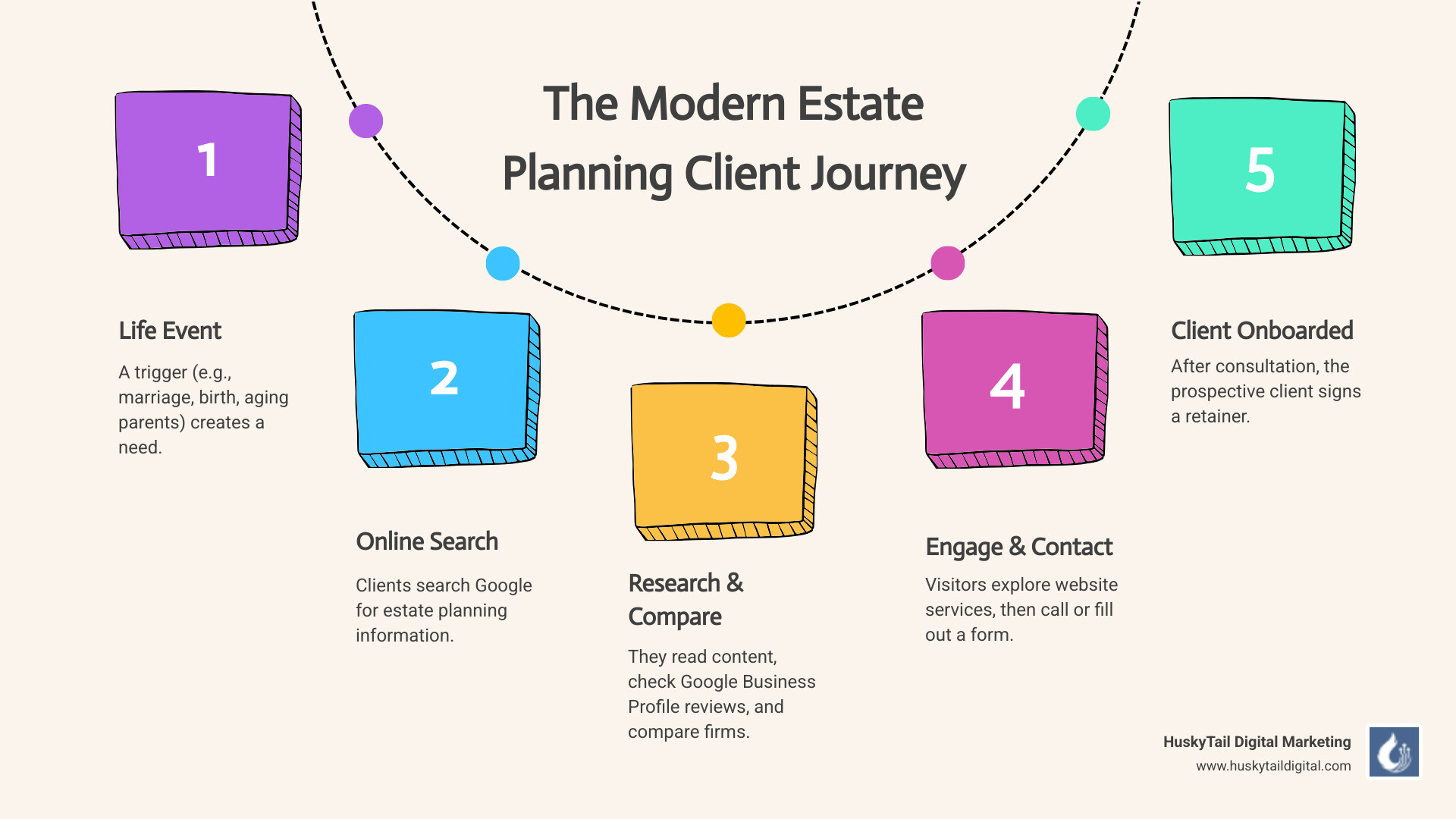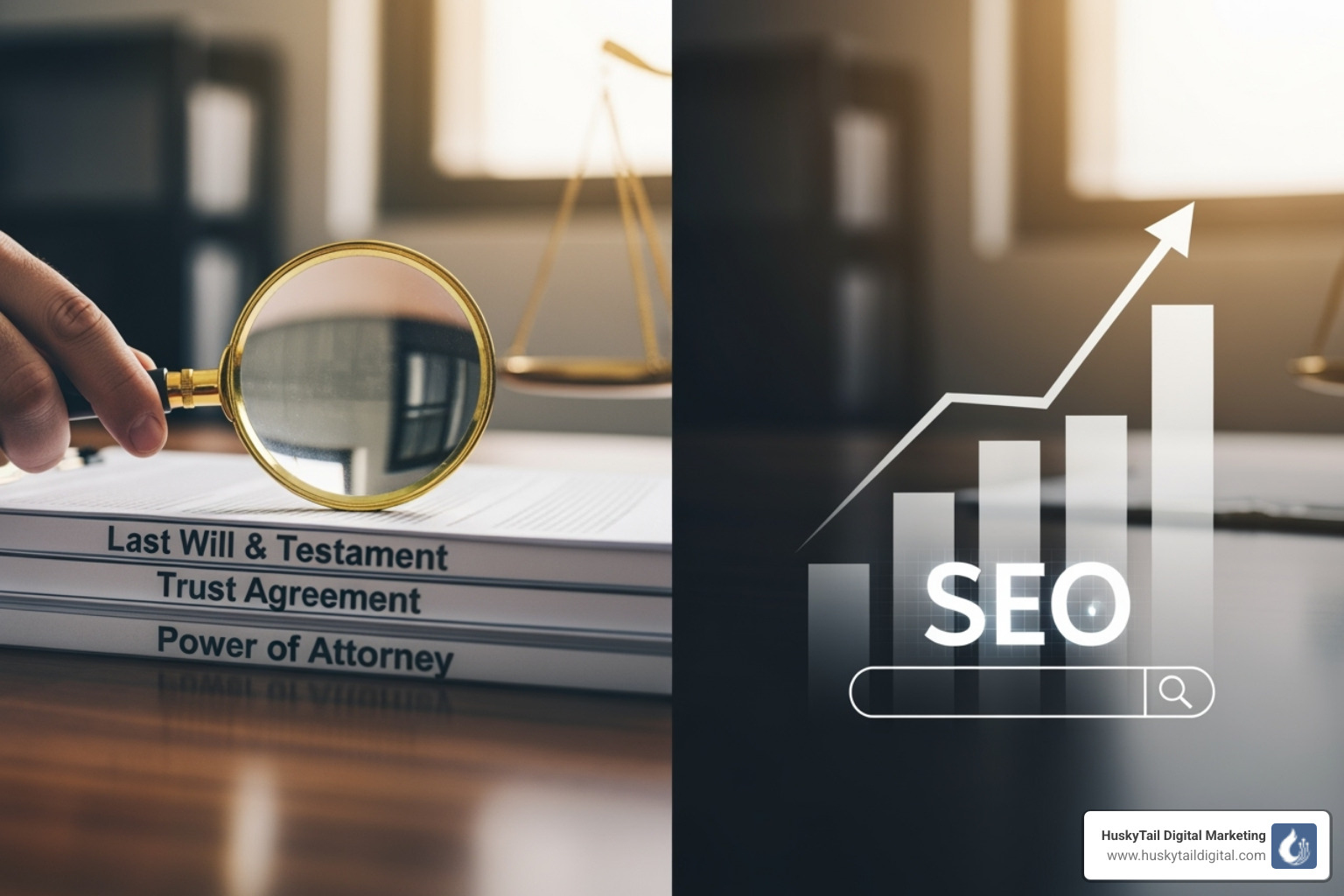Why Estate Planning Attorneys Can't Afford To Ignore SEO In 2025
Estate planning SEO is the practice of optimizing your law firm's online presence to connect with prospective clients when they search for your services. Here's why it's critical:
- It helps your firm appear on Google's first page for searches like "estate planning attorney near me."
- 72% of estate planning clients start their search online, making visibility essential.
- It attracts high-intent clients actively seeking legal help.
- You're competing against over 200,000 estate lawyers in the US alone.
- Modern SEO includes optimizing for AI-driven search results like Google's AI Overviews.
Most attorneys know a website is essential for credibility, but few grasp its role in client acquisition. Your potential clients aren't using phone books; they're typing questions into Google. With 64% of people researching legal concerns online and organic/local search driving 69% of web traffic for firms like yours, being invisible online means losing clients.
The challenge is evolving. Google's AI summaries and ChatGPT now answer legal questions directly. Your website isn't just competing for rankings; it's being interpreted by AI that decides whether to cite you as an authority. This means your SEO in 2025 needs content that both ranks and gets referenced by AI, backed by technical excellence and local dominance.
The good news? Most estate planning firms do this poorly, creating a major opportunity for you.
I'm Stephen Gardner, founder of HuskyTail Digital Marketing. With over 20 years of experience, I help law firms dominate their markets with data-backed estate planning SEO strategies built for today's AI-driven landscape. Let me show you how to position your firm where your next clients are already looking.

Next, we'll break down the core pillars of a winning estate planning SEO strategy that attracts high-value clients and builds lasting authority in your market.
The Core Pillars Of A Winning Estate Planning SEO Strategy
Think of estate planning SEO as building a house; every part must be strong. A fragmented approach—focusing on content but ignoring technical issues, for example—no longer works. Search engines and AI evaluate your entire digital footprint.
A winning strategy rests on four interconnected pillars: on-page SEO (optimizing individual pages), off-page SEO (building reputation through links), technical SEO (ensuring a sound website infrastructure), and local SEO (dominating location-specific searches). When these work in harmony, your website becomes a client-attracting machine that ranks well and converts visitors, especially since organic and local search make up 69% of all web traffic for firms like yours.
Foundational Keyword Research: Finding Your Clients' Search Terms
Before writing anything, you must understand what potential clients are typing into Google. They often search during stressful life moments and need answers now. Your job is to speak their language.
It's crucial to distinguish between research and intent to hire. "What is a living trust" is research. "Estate planning attorney near me" means they're ready to call. We focus on high-intent keywords—your "buyers in pain" terms like "trust attorney consultation" or "will lawyer [your city]."
We also target long-tail keywords. These longer, specific phrases like "how to set up a special needs trust for a disabled child" have lower competition but convert exceptionally well. Using tools like Ahrefs, SEMrush, and Google Keyword Planner, we find the sweet spot: terms with good search volume, manageable competition, and strong conversion potential, which is vital as over half of all website traffic comes from keyword searches.
High-Impact Content & On-Page SEO For Attorneys
Once you know the keywords, you need content that provides real answers, not just legal jargon or thin articles. Your website should be a valuable resource. A strong content strategy includes blog posts on common concerns, detailed service pages (wills, trusts, probate), and comprehensive FAQ sections.
For legal content, Google's E-E-A-T framework—Experience, Expertise, Authoritativeness, and Trustworthiness—is paramount. Google scrutinizes legal advice, so you must prove your credibility. Showcase attorney credentials, share case examples (protecting privacy), and provide accurate, well-researched information.
Even great content needs on-page SEO. These technical details help search engines understand your pages. Key elements include:
- Title Tags: The clickable headlines in search results.
- Meta Descriptions: The short summaries that entice clicks.
- Headers (H1, H2): Structure your content for readers and search engines.
- Image Alt Text: Describes images for accessibility and keyword context.
A powerful, often overlooked strategy is video. Users stay on pages with video 88% longer, sending strong engagement signals to Google and building trust faster than text alone.

Want to see how we build authority beyond your own website? Check out more on our Link Building strategy.
Mastering Local SEO For Estate Planning Attorneys
Your ideal clients are local. They're not searching for the best attorney in the country; they want the best one near them. This makes local SEO a cornerstone of your estate planning SEO strategy.
Searches including "near me" have increased by 200% in two years. Your most powerful tool is your Google Business Profile (GBP). This free listing appears in the local map pack at the top of local searches, putting you front and center when clients are ready to call.
Simply claiming your profile isn't enough. It must be fully optimized with your correct name, address, phone number (NAP), hours, and services. We keep it updated with posts and focus heavily on reviews, as 87% of people read local business reviews before contacting a law firm. Positive reviews build trust and directly boost local rankings.
Beyond GBP, we ensure NAP consistency across all online directories and build local citations to validate your location and legitimacy with Google.

Our dedicated Local SEO services ensure your firm dominates local searches and connects with clients right in your community—exactly when they need you most.
Technical SEO: The Engine Behind Your Rankings
Think of technical SEO as the engine of your estate planning SEO strategy. Your content is the sleek exterior, but without a finely-tuned engine, you're going nowhere. If search engines can't properly crawl and index your website, your content is invisible.
Technical SEO ensures Google's bots can access, understand, and rank your pages. This includes:
- Crawling and Indexing: Making sure your site structure is logical and no important pages are accidentally blocked.
- Website Security (HTTPS): The padlock in the browser bar signals trust to clients and gives you a ranking boost.
- Site Structure and Navigation: Organizing your site logically with clear internal links, helping both users and search engines steer your content.
A comprehensive Technical SEO audit is a full diagnostic check-up for your website. We identify and fix issues like broken links, crawl errors, and duplicate content. Tools like the Yoast plugin can help, but a deep audit is essential. A technically sound site also performs better in AI-driven search, as systems like Google's AI Overviews favor well-structured, accessible sites.
Mobile-First Indexing And Page Speed
A sobering statistic: 53% of mobile users will abandon your site if it takes longer than 3 seconds to load. In 2025, mobile optimization is non-negotiable. Google uses mobile-first indexing, meaning it primarily evaluates the mobile version of your site for ranking. A slow or clunky mobile site is a major liability.
Google's Core Web Vitals directly measure user experience and impact rankings. These include Largest Contentful Paint (LCP) for loading speed, Interaction to Next Paint (INP) for responsiveness, and Cumulative Layout Shift (CLS) for visual stability.
We improve page speed through techniques like image compression, browser caching, and minifying code (HTML, CSS, JavaScript). Speed signals authority; a fast, reliable website is seen as a more trustworthy source by both users and AI.

Building Authority With Off-Page SEO And AI Optimization
Some of the most powerful ranking signals for estate planning SEO come from outside your website. Off-page SEO is your firm's digital reputation—the online equivalent of word-of-mouth referrals.
When other reputable websites link to yours, these backlinks act as votes of confidence. They tell search engines and AI systems that your firm is a trustworthy authority. A strong backlink profile from relevant, respected sources is crucial for earning top rankings.
Strategies For Earning High-Quality Backlinks
Quality trumps quantity. A link from a state bar association is far more valuable than one from a random blog. Effective strategies include:
- Guest Blogging: Contribute valuable articles to legal blogs, financial planning sites, or senior care resources to demonstrate expertise and earn a link.
- Legal Directories: Listings in respected directories like Nolo, LawyerLocate, and your state bar association provide credibility and powerful backlinks.
- Linkable Assets: Create comprehensive guides, checklists, or infographics on your site that other websites will want to reference and share.
- Community Involvement: Sponsoring local events or offering free workshops can lead to links from local news and community organizations.
- Strategic Collaborations: Partner with financial advisors or CPAs on joint content to create natural backlink opportunities.
Want to understand how we systematically build these high-quality backlinks for our clients? Explore More on Link Building to see our approach in action.
The Role Of AI In Modern Estate Planning SEO
Search is changing. Google's Search Generative Experience (SGE) and platforms like ChatGPT now provide direct, summarized answers at the top of the page. Your content is no longer just competing for clicks; it's competing to be cited by AI.
AI systems analyze your site's structure, clarity, and authority to synthesize their responses. To be included, your content must be well-organized, use clear headings, and provide straightforward answers.
This is where E-E-A-T is critical for AI. Google's framework (Experience, Expertise, Authoritativeness, Trustworthiness) is a key factor for AI, which prioritizes reliable sources. Your attorney bios, credentials, and positive reviews all signal to AI that your firm is a credible source.
Optimizing for AI means creating factual, well-structured content that provides definitive answers. Use plain language and cite relevant laws or sources where appropriate. The goal is to become a consistently cited source, achieving an authority that transcends traditional rankings. Our specialized AI SEO services are designed to position your firm for this new AI-powered landscape.
Measuring Success And Avoiding Common SEO Pitfalls
Estate planning SEO is never "done." It's an ongoing process of analysis and adjustment. The firms that succeed long-term are those making data-driven decisions.
Tracking Your SEO Performance
You can't improve what you don't measure. We use powerful tools to track performance:
- Google Analytics 4 (GA4): Shows us what visitors do on your site—where they come from, what they read, and whether they convert into a lead.
- Google Search Console (GSC): Reveals how Google sees your site, including which search queries bring you traffic, your keyword rankings, and any technical issues.
We focus on metrics that matter to your bottom line: organic traffic, keyword rankings for high-intent terms, click-through rate (CTR), and your conversion rate. Regular SEO Audits act as checkups to ensure your strategy remains effective as algorithms evolve.
Common SEO Mistakes That Hurt Law Firms
Many firms fall into common traps that undermine their SEO efforts. Here are the costliest mistakes to avoid:
- Duplicate or Thin Content: Creating multiple pages with nearly identical information or service pages with only a few sentences confuses search engines and offers no user value.
- Keyword Stuffing: Forcing keywords into every sentence makes content unreadable and can lead to penalties. Write for humans first.
- Ignoring the Mobile Experience: With over half of mobile users leaving a site that takes more than 3 seconds to load, a poor mobile experience is a client-repellent.
- Broken Links and Outdated Information: These signal neglect and destroy credibility. Inaccurate legal information is especially damaging under Google's E-E-A-T framework.
- Neglecting Local SEO: Failing to optimize your Google Business Profile or manage reviews makes you invisible to the majority of clients searching locally.
- Ignoring Your Data: Without tracking performance, you're guessing. You might be ranking for keywords that don't convert while missing high-value opportunities.
Our AI-certified approach helps you avoid these pitfalls, ensuring your estate planning SEO strategy stays on track and delivers consistent results.
Frequently Asked Questions About Estate Planning SEO
Here are answers to some of the most common questions we receive about estate planning SEO.
How Long Does It Take To See Results From SEO?
Estate planning SEO is a long-term strategy. While minor improvements can appear in weeks, significant results typically take 6 to 12 months. This timeline depends on factors like market competition, your budget, and the starting condition of your website. The effort is an investment that yields compounding, long-lasting returns.
What Makes SEO For Lawyers Different?
SEO for estate planning attorneys is unique due to:
- High Competition: Standing out among 200,000+ US estate lawyers requires a sophisticated strategy.
- Importance of Trust (E-E-A-T): Search engines prioritize firms that demonstrate experience, expertise, authoritativeness, and trustworthiness.
- Critical Local Focus: Most clients hire locally, making local SEO and "near me" searches paramount.
- Ethical Marketing Considerations: All strategies must adhere to strict bar association rules.
- Urgent Client Needs: Content must be empathetic and clear for clients often facing sensitive life events.
Should Our Firm Handle SEO In-House Or Hire An Agency?
This is a common dilemma. The table below compares the two approaches:
For most firms seeking cutting-edge, data-backed results without the overhead of an in-house marketing department, hiring a specialized agency offers the most strategic advantage. It allows you to focus on serving clients while experts manage your digital growth.
Conclusion
The key takeaway is this: estate planning SEO is the bridge between your expertise and the families who desperately need it.
Right now, someone in your community is worried about their family's future and turning to Google for answers. The question is: will they find you?
You now understand the core principles: attracting high-intent clients, building authority with quality content, mastering local search, and achieving the technical excellence required for both traditional and AI-driven search. The landscape is changing fast, and the firms that thrive will be those whose content is so trustworthy that AI systems cite them as authoritative sources.
This shift levels the playing field. You don't need the biggest ad budget; you need the right strategy, executed with expertise. That's where we come in.
At HuskyTail Digital Marketing, we combine AI-certified expertise with a genuine passion for your success. We build sustainable growth for your firm, and through our Hearts for Huskies initiative, every client we help also supports a rescue husky.
Your future clients are searching now. With the right estate planning SEO strategy, you can be there when they need you most.
Ready to dominate search results and attract more high-value clients? Explore our specialized SEO services for Estate Planning Attorneys. Let's build something remarkable together.
-p-1080.webp)


.avif)









.webp)
.avif)
.avif)

